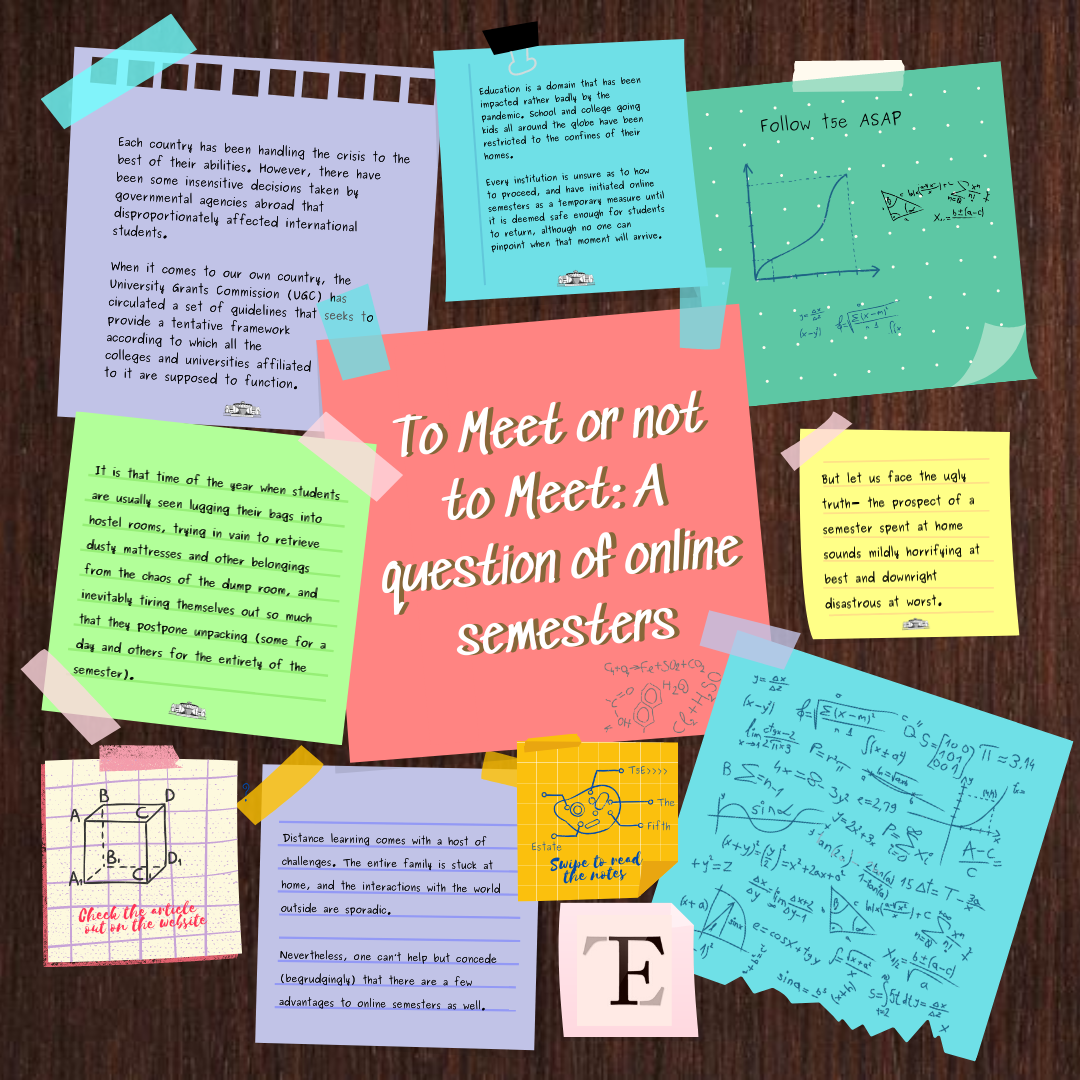Design by: Shreethigha G
It is that time of the year when students are usually seen lugging their bags into hostel rooms, trying in vain to retrieve dusty mattresses and other belongings from the chaos of the dump room, and inevitably tiring themselves out so much that they postpone unpacking (some for a day and others for the entirety of the semester).
But the best part of the day is the reunions – the chatter of a loud gaggle of girls hugging each other in front of Sharav, of bros catching up over midnight chai and Maggi, of couples meeting after months in the solitude of the night, and of occupied tables at CCD filled with excited students planning activities for the upcoming months. And then came COVID-19, rudely interrupting our academic year and wreaking all sorts of havoc in its wake, one of its many undesirable consequences being the tragedy that is the online semester.
Education is a domain that has been impacted rather badly by the pandemic. School and college-going kids all around the globe have been restricted to the confines of their homes.
Furthermore, they are expected to carry out their academic pursuits amidst all the uncertainty as though nothing has changed. Several college students seem to have mastered the art of attending online lectures in the morning precisely two minutes after they’ve woken up. After all, your professors and classmates will never find out that you haven’t bathed in two days and that you’ve been wearing the same smelly t-shirt for the past week (well, the only glaring dissimilarity between this and regular college life is that one usually bothers wearing pants to class).
Universities and colleges around the world had to halt functioning rather abruptly in March, sending most of their students home in haste while international students had to stay back on campus, for international air travel was one of the first modes of transportation to be suspended. And ever since then, the entire world has been trapped in a state of unending uncertainty. Every institution is unsure as to how to proceed, and have initiated online semesters as a temporary measure until it is deemed safe enough for students to return. However, no one can pinpoint when that moment will arrive.
Each country has been handling the crisis to the best of their abilities. However, there have been some insensitive decisions taken by governmental agencies abroad that disproportionately affected international students. There was a global outcry when the U.S Immigration and Customs Enforcement (ICE) decided to take matters into their own hands and ban new international students from entering the country if they were enrolled in online-only classes for the fall semester (while those who were “actively enrolled” in classes up until March 9th would remain unaffected). ICE also decreed that schools were disallowed from providing these students with the I-20 forms which would provide them the status of a legal student. The enormity of this decision increases in light of the fact that almost 12% of all American colleges and universities plan on transitioning into the realm of digital education for the forthcoming term. Nevertheless, ICE repealed the earlier directives that would have forced countless international students to return to their native countries despite the health risks, thanks to the widespread backlash and multiple lawsuits filed by prestigious universities like Harvard and MIT.
When it comes to our own country, the University Grants Commission (UGC) has circulated a set of guidelines that seeks to provide a tentative framework according to which all the colleges and universities affiliated to it are supposed to function.
This includes the instruction that all colleges are to finish conducting examinations for the previous semester by the end of September – either offline, online or a combination of both. However, utmost care must be taken to ensure proper social distancing norms and healthcare provisions during the process. After considerable deliberation, all the IITs have prepared to begin the first semester of this academic year via online classes as well. The alumni at IIT Bombay have also set up avenues for donations to aid students who come from economically underprivileged backgrounds, and those who face difficulties when it comes to accessing the internet and course material. The pandemic situation will be reviewed again in October, and decisions regarding the future will be taken subsequently.
Let us face the ugly truth- the prospect of a semester spent at home sounds mildly horrifying at best and downright disastrous at worst. Mustering enough concentration to scrape through online tests and submit assignments necessitate Herculean efforts (and for those extraordinary mortals who seem to manage just fine- TEACH US YOUR WAYS). Online semesters also restrict the number of extra-curricular opportunities. A potential year without Litsoc, Schroeter, and every other fiercely competitive enterprise that imbibes (not-so) friendly rivalry sounds exceedingly dull.
Distance learning comes with a host of challenges. The entire family is stuck at home, and the interactions with the world outside are sporadic. Many students have to bear the additional burden of managing their households.
Juggling between coursework that miraculously seems to double with every passing hour, POR tasks, preparing meals, teaching your (boomer) parents to use technology and helping your siblings with homework can take quite a toll on one’s sanity. Several students also lack the privacy, the peace and quiet that is a prerequisite for an environment that is conducive to academic learning. On a more serious note, the mental wellbeing of adolescents has taken a tremendous hit during the lockdown. Poor mental health can be attributed to difficulties in coping with the pressure of maintaining decent grades, financial constraints (for several adults have lost their jobs to the economic crisis) or turbulent homes. Access to online classes, a stable internet connection or even essential supplies such as groceries is a major barrier for some students, and T5E even conducted a survey on the same. The blurred lines between work, leisure and chores cumulate into a very stressful and unbalanced lifestyle for a significant portion of the student population.
Nevertheless, one can’t help but concede (begrudgingly) that there are a few advantages to online semesters as well. For one, it doesn’t require a fixed schedule. The flexibility provides leeway to pursue other projects and commitments as well. It is also rather convenient to have the option of revisiting recorded lectures in case there’s a class early in the morning that you just cannot be bothered to wake up for. An online education also enables access to certain specialised degrees or courses that may not be available in mainstream institutions. Several universities have started educational webinars and launched online degrees, including IIT Madras, whose new BSc degree in Data Science has been gaining quite a bit of traction. And though it may sound cliche, this is the perfect time to develop new skills and learn something you’ve always wanted to pick up (yes, practise some chords on that guitar that’s been lying in your room for eternity). And maybe, just maybe, you can finally slow down from the hectic blur that college life is and give yourself some space to breathe.
With time (and a lot of cribbing), we’ll acquaint ourselves with how online semesters work, and also gain a little more clarity regarding when we’ll be allowed to return.
Even so, it is certain that everyone misses insti in varying degrees. Maybe it’s the hurried rush of cycling to your morning lectures, or scrounging for chairs in the library on a humid afternoon. Maybe it’s the bustle of activities that happen on the Himalaya lawns nearly every weekend, or the solitude and peace that accompanies long walks with your friends late into the night. Maybe the smell of mess food pervades your senses at random moments of the day, or you dream of finally outsmarting those infuriating monkeys in your hostel. But all we can do as of now is prepare ourselves to weather the storm, and to wait, watch and hope that soon enough, we shall experience a semester that’s filled with laughter, procrastination, a little bit of drama, a bunch of people, and a whole lot of love – a regular semester.
Edited by: Amrita Mahesh




